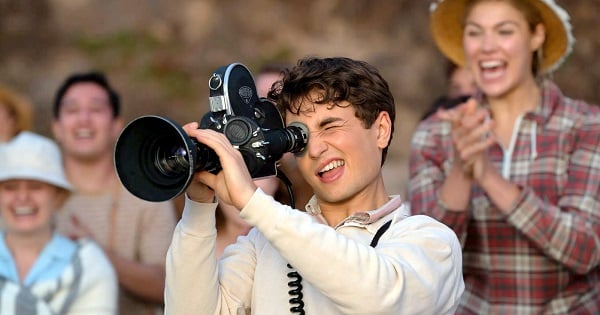Steven Spielberg tells the coming-of-age period piece of Sammy Fabelman (played by Mateo Zoryan as a boy, and Gabriel LaBelle as a teen) in the fittingly titled The Fabelmans.
The semi-autobiographical tale about a Jewish boy discovering his professional vocation of filmmaking marks one of the better-handled films about the filmmaking industry.
Hollywood Loves to Make Movies About Itself
Hollywood often makes films about itself that contain some self-reverential aura to them. They’re usually a peek into how difficult it is to get a movie made, reinforcing the truism that movies are not so much made as forced into existence.
This sub-genre is typically awarded at year’s end, deservedly or not.
Spielberg’s latest film is worthy of its accolades yet avoids any sense of smugness. The film makes the case that if one truly finds their vocation in directing, then by adulthood their art should be effortless and speak for itself.
This sets The Fabelmans apart from other films in the genre which usually can’t wait to tell the viewer what a long, hard slog production was.
The Fabelmans Is About a Family
Family signifies the film’s other appealing aspect. The film’s title is plural. Sammy doesn’t find what he’s to do with his life in a vacuum, but realizes a calling nurtured and refined within the context of a family.
His always supportive mother (Michelle Williams) provides artistic guidance. She is a skilled pianist yet sacrificed her dreams to raise her family.
Sammy’s dad (Paul Dano) toils away as an engineer. He sees Sammy’s hobby as a highly technical one and a way to propel the boy into a hard-sciences profession. The father balks, though, at the prospect of Sammy eking out an existence in the film industry.
The three younger sisters crew Sammy’s short films and their quirky stories growing up lay some Easter Eggs for the astute viewer. For example, the Fabelmans’ pet monkey and dad’s fedora hat point to the inspiration for Indiana Jones.
The Importance of Faith
A conservative version of Judaism binds the family of six. They’re often seen taking meals together and, in a practice, I was ignorant of, they observe an interesting ritual of folding up the paper tablecloth and paper plates and utensils and disposing of them.
I would argue that the faith aspect fashions Sammy’s artistic voice the best. As a practicing Jew, he’s part of a religious minority, much the way Catholics may have felt at the time (or even now, in many areas).
While formed in faith and values, Judaism is singular, however, in its lack of evangelical fervor. So, in Sammy (and Spielberg we presume) you see a director who always holds out hope in the end, yet it’s hope organic to the story and characters, not something shoehorned in as an obligatory altar call.
Truths That the Camera Reveals
Absorbing life lessons, specifically in a family of faith, is directly parallel to the technical nuances Sammy would employ later in his career.
Reviewing footage of a camping trip, to his horror, Sammy notices in the background his mother and his father’s best friend holding hands.
The mother reviews the footage in a dark closet while her son waits outside. As the reel finishes tumbling through the projector, she emerges from the closet in tears.
Sammy assures her he won’t tell anyone of her briefest of indiscretions. The scene plays as a confessional. The mother looking for hope. The son standing in as the “Catholic priest.”
What You Put in, and What You Leave Out
What separates Spielberg as a master of his craft, then, is not so much what he depicts onscreen. A chance meeting with Irish Catholic director John Ford alludes to the notion Sammy will eventually know where to put the horizon line in a frame to avoid boring his audience.
It’s what he doesn’t choose to depict or force through on-the-nose dialogue that makes him one of the greats.
The late great film critic, Roger Ebert, in his book The Great Movies, remembers taking his niece and nephew to see E.T.: The Extra-Terrestrial.
When E.T. in fact, “goes home” there’s an adult E.T. waiting at the entrance to the spaceship. Ebert’s nephew shouted out, “It’s E.T.’s mommy!”
The film doesn’t tell us that. It could have been E.T.’s dad. Or it could have been the captain of the ship, who doesn’t know the principal character from anyone else of his species.
But a clunky subtitle or dialogue from a lesser director would have certainly ruined the moment. Spielberg left the mystery to Ebert’s nephew and to us.
The Fabelmans is rated PG-13 for instances of language; there's also scenes of bullying and anti-Semitism, and some mild romance.
Image: Universal Pictures
Click here to visit USC-film-school graduate Father Vince Kuna’s IMDB page.
Keep up with Family Theater Productions on our website, Facebook, Twitter, Instagram and YouTube.
